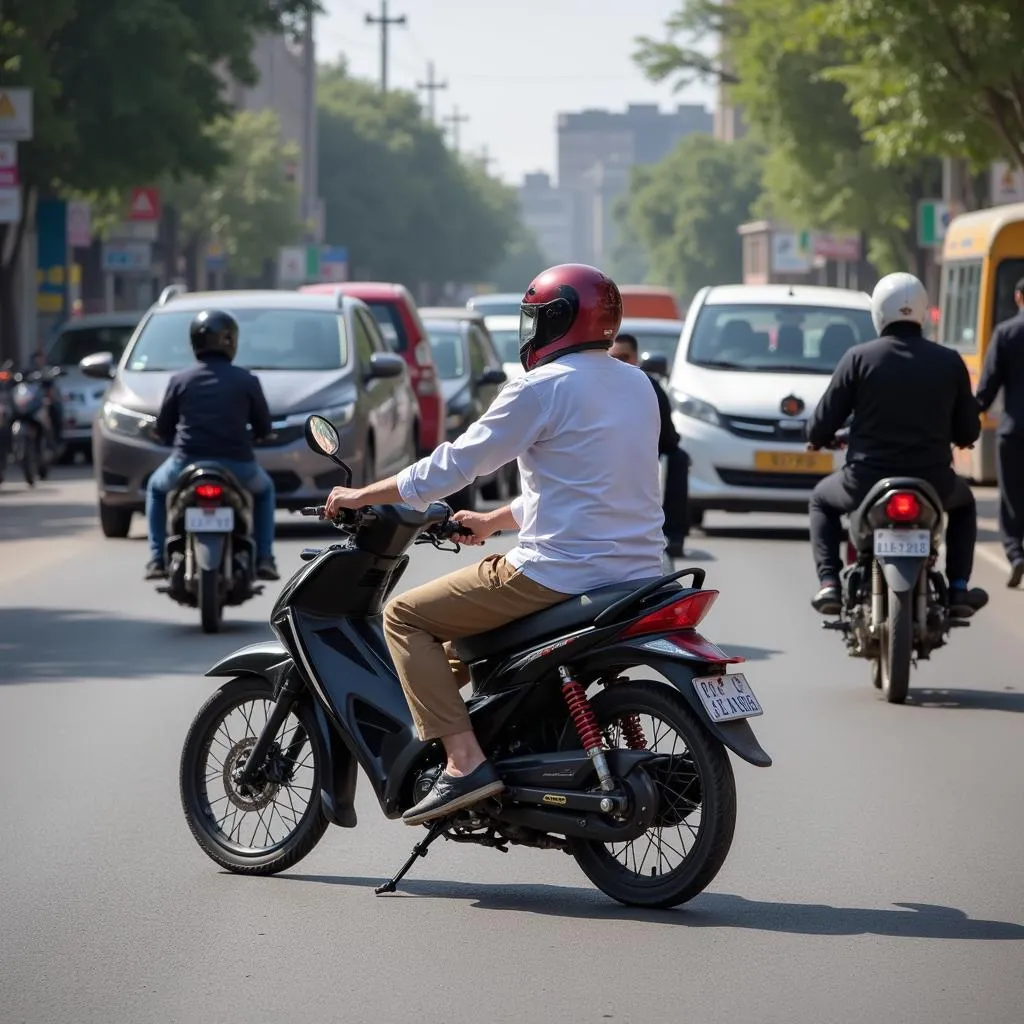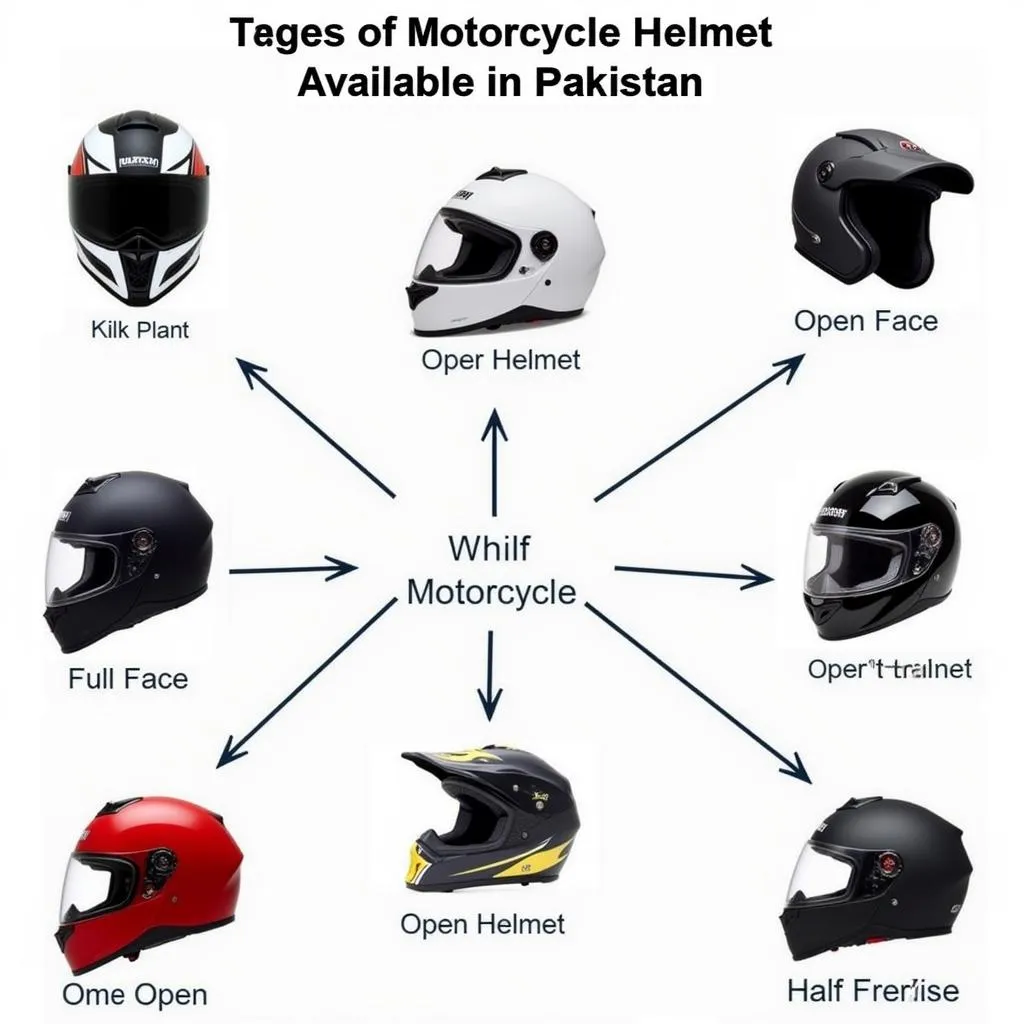Helmets are non-negotiable when it comes to road safety in Pakistan. Whether you’re zipping through the bustling streets of Lahore on a motorcycle or navigating the highways on a bicycle, a helmet is your first line of defense against head injuries. This comprehensive guide delves into everything you need to know about helmets in Pakistan, from the legal aspects to choosing the right one for your needs.
Why Helmets Are Crucial in Pakistan
Pakistan’s roads, unfortunately, have a high rate of accidents, and head injuries are among the most common and severe consequences. A helmet acts as a protective barrier, absorbing the impact and reducing the force transmitted to the head in a collision. This simple act can significantly reduce the risk of skull fractures, brain injuries, and even fatalities.
 Motorbike Accident in Pakistan
Motorbike Accident in Pakistan
The Law on Helmet Use in Pakistan
In many major cities across Pakistan, wearing a helmet while riding a motorcycle is mandatory. Law enforcement agencies are actively enforcing this rule, and hefty fines are imposed on those who don’t comply. Wearing a helmet is not just about avoiding a ticket; it’s about protecting your life.
Choosing the Right Helmet
With a wide variety of helmets available in the market, it can be overwhelming to choose the right one. Here’s a breakdown of the main types of helmets in Pakistan:
- Full-face Helmets: Offer the highest level of protection, covering the entire head and face. Ideal for high-speed riding and long journeys.
- Open-face Helmets: Provide protection to the top and sides of the head but leave the face exposed. Popular for short commutes and city riding.
- Half Helmets: Cover only the top of the head, offering the least amount of protection. Not recommended for high-speed riding.
Factors to Consider When Buying a Helmet in Pakistan
- Safety Standards: Look for helmets certified by recognized international standards such as DOT, ECE, or Snell.
- Fit: The helmet should fit snugly on your head, with no gaps or pressure points.
- Ventilation: Ensure adequate ventilation to prevent fogging and overheating, especially in Pakistan’s hot climate.
- Visor: A clear and scratch-resistant visor is essential for clear visibility.
- Price: Helmets are available at various price points, but never compromise safety for cost.
 Variety of Motorcycle Helmets in Pakistan
Variety of Motorcycle Helmets in Pakistan
Maintaining Your Helmet
- Clean your helmet regularly: Sweat and dirt can damage the helmet’s lining.
- Replace your helmet after a crash: Even if the helmet appears undamaged, it may have sustained internal damage.
- Don’t store your helmet in direct sunlight: Heat can degrade the helmet’s material.
The Importance of Helmet Use for Children
Children are particularly vulnerable to head injuries. Make sure your children always wear a helmet that fits properly and is designed for their age and head size. Lead by example and always wear a helmet yourself to instill good safety habits.
Common Myths About Helmets in Pakistan
- “Helmets are uncomfortable, especially in the heat.” Modern helmets are designed with ventilation to keep you cool and comfortable.
- “Helmets obstruct my vision.” A properly fitted helmet should not obstruct your peripheral vision.
- “Helmets are too expensive.” The cost of a helmet is insignificant compared to the potential cost of a head injury.
Investing in a helmet is investing in your safety. Make the smart choice and protect yourself on the roads of Pakistan.
Frequently Asked Questions about Helmets in Pakistan
- Is it mandatory to wear a helmet in Pakistan? Yes, it is mandatory in many major cities.
- Where can I buy a certified helmet in Pakistan? You can find certified helmets at reputable motorcycle dealerships and online retailers.
- What is the price range of helmets in Pakistan? Prices vary depending on the type and brand, but you can find decent quality helmets starting from kids cycle price in pakistan.
- How often should I replace my helmet? It’s generally recommended to replace your helmet every 5 years or after a crash.
Other Resources
- National Highway & Motorway Police: For information on traffic laws and safety regulations.
- Pakistan Red Crescent Society: For first aid training and road safety awareness programs.
Need Help?
For any queries or assistance regarding helmets or road safety in Pakistan, please contact us at:
Phone Number: +923337849799
Email: news.pakit@gmail.com
Address: Dera Ghazi Khan Rd, Rakhni, Barkhan, Balochistan, Pakistan.
We have a 24/7 customer support team to assist you.